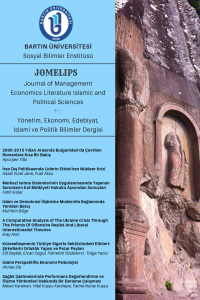Abstract
Sürdürülebilir ekonomik kalkınma için gerekli olan
teknolojik üretkenlik, kaynak verimliliği, ileri teknoloji bilgisi, ortak
çalışma kültürü, işbölümü ve süreç optimizasyonu gibi temel yapıların politika
ve kurumsal düzeyde tesis edilmesi büyük öneme sahiptir. Ancak, etik değerlere, diğer insan ve canlıların
hukuklarına saygı, yardımda bulunma, toplumsal düzene uyma ve bilinçli olarak
insanlığın yararına çalışma gibi temel ilkelerin uygulanabilirliği ve
insanların psikolojik olarak bu ilkelere istekli bir şekilde kabullenerek
uygulamaları sürdürülebilir kalkınma kadar toplumsal refah, insan huzuru ve
mutluluk açısından çok daha önemlidir. Çalışmamızda toplumsal huzur ve
insanlığın topyekûn gelişimini sağlayacak bir etik değerler bütünü sunabilen
İslam dininin şahsi, sosyal ve iktisadi hayatı düzenleyen temel ilkelerinin
uygulanabilirliği Risale-i Nur tefsiri referansıyla bazı örnekler üzerinden
araştırılmaktadır. Temel argümanımız bunun maddi politika ve kurumsal
tedbirlerle değil güçlü iman ve samimi kabuller ile doğrudan ilgili olmasından
dolayı psikolojik temellerinin ihmal edilmemesi gerektiği ekonomik, dini ve
psikolojik analizler yapılarak değerlendirilmektedir.
References
- Ansari, A. H., Jamal, P., & Oseni, U. A. (2012). Sustainable Development: Islamic Dimension with Special Reference to Conservation of the Environment. Advances in Natural and Applied Sciences, 607-619.
- Ansari, M. (1994). İslamic Perspectives on Sustainable Development. The American Journal of Islamic Studies, 394–402.
- Aström, Z. H. (2011). Paradigm Shift for Sustainable Development: The Contribution of Islamic Economics. Journal of Economic and Social Studies, 73-84.
- Branco, M. C. (2007). Family, Religion and Economic Performance: A Critique of Cultural Determinism. Review of Social Economy, Vol. Lxv, No. 4, December, 407-424.
- Bruce J. Perlman, G. G. (2007). Cultural Determinism versus Administrative Logic: Asian Values and Administrative Reform in Kazakhstan and Uzbekistan. International Journal of Public Administration, Volume 30, Issue 12-14, 1327-1342.
- Gundolf, K., & Filser, M. ( 2013). Management Research and Religion: A Citation Analysis. Journal of Business Ethics, January 1,, 177–185.
- Hasan, Z. (2006). Sustainable Development from an Islamic Perspective: Meaning, Implications, and Policy Concerns . Islamic Economics, Vol. 19, 3-18.
- Hill, L. E. (1989). Cultural Determinism or Emergent Evolotion: An Analysis of the Controversy Between Clarenve Ayres and David Miller. Journal of Economik Issues, Vol. XXIII, No. 2, 465-471.
- Koehler, B. (2011). The Economist Mohammed Ibn Abdullah (570 – 632). Economic Affairs, 109-114.
- Marsuki, M. Z. (2009). Religious Agendas Towards Sustainable Development: An Islamic Perspective. Malaysian Journal of Science and Technology Studies, 22-39.
- Minkenberg, M. (2007). Democracy and Religion: Theoretical and Empirical Observations on the Relationship between Christianity, Islam and Liberal Democracy. Journal of Ethnic and Migration Studies,Vol. 33, No. 6, August, 887-909.
- Mirakhor, A. (2014). The Starry Heavens Above and the Moral Law Within: On the Flatness of Economics. Econ Journal Watch, 186-193.
- Nakvi, N. H. (1985). Ekonomi ve Ahlak. İstanbul: İnsan Yayınları.
- Nienhaus, V. (2013). Method and Substance of Islamic Economics: Moving Where? Islamic Economics, 169-202.
- Nursi, B. S. (1655). Lemalar. İstanbul: Envar Neşriyat.
- Nursi, B. S. (1950). Hutbe-i Şamiye. İstanbul: Envar Neşriyat.
- Nursi, B. S. (1956). Mektubat. İstanbul: Envar Neşriyat.
- Nursi, B. S. (1960). Sözler. İstanbul: Envar Neşriyat.
- Nursi, B. S. (1993). Münazarat. İstanbul: Envar Neşriyat.
- Riis, O. (1989). The Role of Religion in Legitimating the Modern Structuration of Society. Acta Sociologia, 137153.
- Steigerwald, D. (2005). Our New Cultural Determinizm. Society, January 1, 71-75.
- Wight, J. B. (2014). Economics within a Pluralist Ethical Tradition. Review of Social Economy, Volume 72, Issue 4, 417-435.
- Wilber, C. K. (1974). The 'New' Economic History Re-examined: R. H. Tawney on the Origins of Capitalism. American Journal of Economics & Sociology, July 1,, 249-258.
- Zaman, A. (2012). Crisis in Islamic Economics: Diagnosis and Prescriptions. Islamic Econ, n., Vol. 25 No. 1, 143-166.
Abstract
References
- Ansari, A. H., Jamal, P., & Oseni, U. A. (2012). Sustainable Development: Islamic Dimension with Special Reference to Conservation of the Environment. Advances in Natural and Applied Sciences, 607-619.
- Ansari, M. (1994). İslamic Perspectives on Sustainable Development. The American Journal of Islamic Studies, 394–402.
- Aström, Z. H. (2011). Paradigm Shift for Sustainable Development: The Contribution of Islamic Economics. Journal of Economic and Social Studies, 73-84.
- Branco, M. C. (2007). Family, Religion and Economic Performance: A Critique of Cultural Determinism. Review of Social Economy, Vol. Lxv, No. 4, December, 407-424.
- Bruce J. Perlman, G. G. (2007). Cultural Determinism versus Administrative Logic: Asian Values and Administrative Reform in Kazakhstan and Uzbekistan. International Journal of Public Administration, Volume 30, Issue 12-14, 1327-1342.
- Gundolf, K., & Filser, M. ( 2013). Management Research and Religion: A Citation Analysis. Journal of Business Ethics, January 1,, 177–185.
- Hasan, Z. (2006). Sustainable Development from an Islamic Perspective: Meaning, Implications, and Policy Concerns . Islamic Economics, Vol. 19, 3-18.
- Hill, L. E. (1989). Cultural Determinism or Emergent Evolotion: An Analysis of the Controversy Between Clarenve Ayres and David Miller. Journal of Economik Issues, Vol. XXIII, No. 2, 465-471.
- Koehler, B. (2011). The Economist Mohammed Ibn Abdullah (570 – 632). Economic Affairs, 109-114.
- Marsuki, M. Z. (2009). Religious Agendas Towards Sustainable Development: An Islamic Perspective. Malaysian Journal of Science and Technology Studies, 22-39.
- Minkenberg, M. (2007). Democracy and Religion: Theoretical and Empirical Observations on the Relationship between Christianity, Islam and Liberal Democracy. Journal of Ethnic and Migration Studies,Vol. 33, No. 6, August, 887-909.
- Mirakhor, A. (2014). The Starry Heavens Above and the Moral Law Within: On the Flatness of Economics. Econ Journal Watch, 186-193.
- Nakvi, N. H. (1985). Ekonomi ve Ahlak. İstanbul: İnsan Yayınları.
- Nienhaus, V. (2013). Method and Substance of Islamic Economics: Moving Where? Islamic Economics, 169-202.
- Nursi, B. S. (1655). Lemalar. İstanbul: Envar Neşriyat.
- Nursi, B. S. (1950). Hutbe-i Şamiye. İstanbul: Envar Neşriyat.
- Nursi, B. S. (1956). Mektubat. İstanbul: Envar Neşriyat.
- Nursi, B. S. (1960). Sözler. İstanbul: Envar Neşriyat.
- Nursi, B. S. (1993). Münazarat. İstanbul: Envar Neşriyat.
- Riis, O. (1989). The Role of Religion in Legitimating the Modern Structuration of Society. Acta Sociologia, 137153.
- Steigerwald, D. (2005). Our New Cultural Determinizm. Society, January 1, 71-75.
- Wight, J. B. (2014). Economics within a Pluralist Ethical Tradition. Review of Social Economy, Volume 72, Issue 4, 417-435.
- Wilber, C. K. (1974). The 'New' Economic History Re-examined: R. H. Tawney on the Origins of Capitalism. American Journal of Economics & Sociology, July 1,, 249-258.
- Zaman, A. (2012). Crisis in Islamic Economics: Diagnosis and Prescriptions. Islamic Econ, n., Vol. 25 No. 1, 143-166.
Details
| Primary Language | Turkish |
|---|---|
| Subjects | Business Administration |
| Journal Section | Research Article |
| Authors | |
| Publication Date | June 30, 2019 |
| Submission Date | November 1, 2018 |
| Published in Issue | Year 2019 Volume: 4 Issue: 1 |
Cited By
Comprehensive Development of Human Capital as an Aspect of Innovative Economies
Uluslararası Beşeri Bilimler ve Eğitim Dergisi
https://doi.org/10.59304/ijhe.1189232
Papers are controlled by the Ithenticate program against plagiarism
All published articles have the DOI number.
 JOMELIPS is licensed under a Creative Commons Attribution-NonCommercial-ShareAlike 4.0
International (CC BY-NC-SA 4.0)https://creativecommons.org/licenses/by-nc-sa/4.0/
JOMELIPS is licensed under a Creative Commons Attribution-NonCommercial-ShareAlike 4.0
International (CC BY-NC-SA 4.0)https://creativecommons.org/licenses/by-nc-sa/4.0/
.


